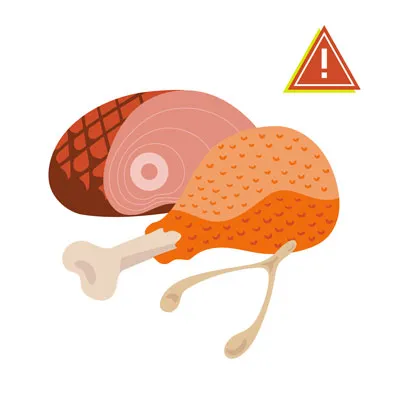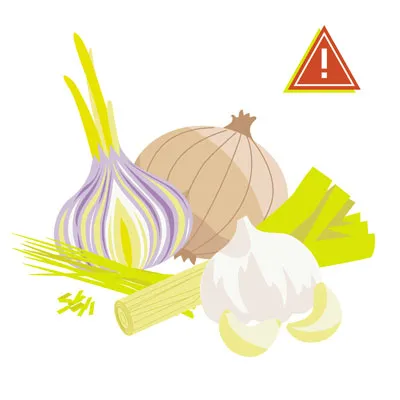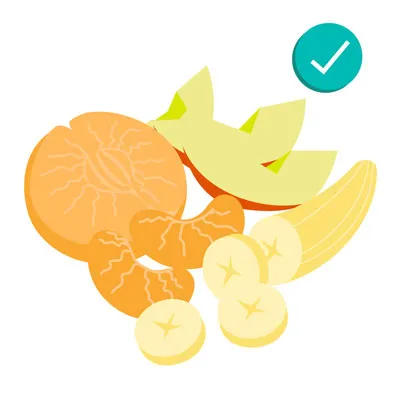As loving dog owners, we always want to share our lives, and often our food, with our furry companions. However, what’s good for us isn’t always good for them. Certain human foods, especially some types of meat, can be highly toxic or even fatal to dogs, leading to over 400,000 pet poisonings in the U.S. annually. Understanding what foods your dog can and cannot eat is crucial for their health and well-being. This guide aims to equip you with the essential knowledge to keep your canine friend safe and healthy, focusing particularly on meats and other common household foods that pose significant risks. For a broader understanding of what canine companions should avoid, explore our detailed article on what foods dogs can t eat.
Our dogs’ digestive systems and metabolisms are vastly different from our own. This physiological disparity means that their bodies process substances uniquely, often leading to adverse reactions to foods we consider harmless. For example, dogs metabolize compounds like theobromine in chocolate much slower, allowing toxins to accumulate and potentially cause severe illness or death. Similarly, while humans can digest many fruits, the pits or seeds of certain fruits contain cyanide, which can be problematic for dogs in large quantities. Understanding these fundamental differences is the first step in safeguarding your dog’s diet.
The Most Dangerous Meats and Other Foods for Dogs
When considering “What Is The One Meat That Dogs Should Never Eat,” two categories stand out due to their high risk: fatty cuts of meat and raw meat. Both present distinct, severe dangers to your dog’s health. While it’s difficult to pinpoint a single “one meat” given the varied risks, understanding these categories is paramount.
Fatty Cuts of Meat: A Hidden Danger
One of the most insidious dangers in the realm of meat for dogs comes from fatty cuts of meat, including chicken or turkey skin, ham, bacon, and other heavily marbled portions. These items are bad for dogs because of their excessively high fat content. Consuming these fatty scraps, even in small amounts, can trigger a life-threatening condition known as acute pancreatitis.
Pancreatitis is the inflammation of the pancreas, an organ crucial for digestion and blood sugar regulation. When the pancreas becomes inflamed, it can lead to severe abdominal pain, vomiting, diarrhea, lethargy, and in serious cases, multi-organ failure and death. The sudden onset and severity of acute pancreatitis make fatty meats a primary concern for dog owners. It’s a common misconception that table scraps, especially those containing meat, are harmless treats. However, the fat content in these foods far exceeds what a dog’s digestive system is designed to handle.
Raw or Undercooked Meat: A Risk of Pathogens
Another type of meat dogs should absolutely avoid is raw or undercooked meat. While some advocate for raw diets, the risks associated with feeding raw meat often outweigh the potential benefits. Raw or undercooked meat can harbor dangerous bacteria such as Salmonella and E. coli, which can cause severe gastrointestinal illness in dogs, just as they do in humans. Symptoms can include vomiting, diarrhea, lethargy, and abdominal pain. Moreover, these pathogens can be shed in your dog’s feces, posing a risk of transmission to humans and other pets in the household.
Beyond bacterial contamination, raw meat often contains bones, which present a significant choking hazard and can cause internal injuries. Bones can splinter, leading to obstructions or perforations in the digestive tract, potentially resulting in fatal abdominal infections. Therefore, for the safety of both your pet and your family, it is strongly recommended to never feed raw or undercooked meat to your dog.
 A dog looking at a plate of cooked ham, highlighting the danger of fatty human foods.
A dog looking at a plate of cooked ham, highlighting the danger of fatty human foods.
Other Meats and Related Products to Avoid
While fatty and raw meats are top concerns, other meat-related items also pose risks:
- Cooked Bones: While raw bones are dangerous due to splintering, cooked bones become brittle and can splinter even more easily, causing blockages or perforations in the digestive system. Always remove bones before giving any cooked meat to your dog.
- Highly Processed Meats: Deli meats, hot dogs, and heavily seasoned or salted meats should be avoided. These often contain high levels of sodium, nitrates, and other additives that are unhealthy for dogs and can contribute to salt poisoning or other health issues.
- Gravy and Sauces: Many gravies and sauces are rich in fat, salt, and sometimes contain ingredients toxic to dogs, such as onions or garlic. Always serve plain, unseasoned meat if offering it as a treat.
Other Common Foods Dogs Cannot Eat
Beyond meat, numerous other household foods are toxic or dangerous for dogs. Being aware of these can prevent accidental poisonings.
Chocolate, Caffeine, and Xylitol: The Triumvirate of Toxicity
These three substances are among the most common and dangerous toxins for dogs.
- Chocolate: Contains theobromine and caffeine, which dogs metabolize slowly. Dark chocolate and baker’s chocolate are the most dangerous due to higher concentrations of theobromine. Ingestion can lead to hyperactivity, vomiting, diarrhea, abnormal heart rhythms, and seizures. If your dog eats any amount of chocolate, contact your vet immediately.
- Caffeine: Found in coffee, tea, energy drinks, and some medications, caffeine also contains methylxanthines. Symptoms of caffeine poisoning are similar to chocolate poisoning and can be fatal.
- Xylitol: A sugar substitute found in sugar-free gum, candies, baked goods, and some peanut butters. Xylitol causes a rapid and severe drop in blood sugar (hypoglycemia) in dogs, leading to weakness, seizures, and potentially liver failure. Even small amounts can be deadly. Always check ingredient labels on human foods, especially peanut butter, before sharing with your dog.
 A picture of chocolate bars, a common household item toxic to dogs.
A picture of chocolate bars, a common household item toxic to dogs.
Fruits, Vegetables, and Nuts: Seemingly Innocent, Potentially Harmful
Many healthy human snacks are not safe for dogs.
- Grapes and Raisins: Highly toxic, even in small amounts, and can cause acute kidney failure in dogs. The exact mechanism is still being studied, but tartaric acid is a suspected culprit.
- Avocado: Contains persin, which can be problematic for some animals, though severe reactions in dogs are rare. However, the pit can cause a choking hazard or gastrointestinal obstruction.
- Onions, Garlic, Chives, and Leeks: All members of the allium family, these vegetables contain compounds (sulfoxides and disulfides) that can damage red blood cells and cause anemia in dogs. This includes powders found in many processed foods.
- Macadamia Nuts: Highly toxic, causing weakness, vomiting, tremors, and hyperthermia. Even a small number can lead to severe poisoning. Other nuts like almonds and pistachios are not inherently toxic but can be choking hazards or cause digestive upset due to high fat content.
- Fruit Pits and Seeds: Apple seeds, and the pits of cherries, peaches, and plums contain cyanide, which is toxic. Always remove these before offering fruit flesh.
- Rhubarb and Star Fruit: These contain soluble calcium oxalate crystals, which can bind with calcium in the body, leading to a dangerous drop in calcium levels and potentially kidney failure.
Other Toxic or Harmful Ingredients
- Alcohol: Extremely toxic to dogs due to their smaller size and different metabolism. Even small amounts can lead to vomiting, breathing problems, coma, or death.
- Yeast and Raw Dough: Raw dough can expand in a dog’s stomach, causing severe pain, bloating, and potentially life-threatening torsion or rupture. The yeast can also ferment, producing alcohol and leading to alcohol toxicity.
- Salt: Excessive salt intake can lead to sodium ion poisoning, causing tremors, seizures, vomiting, diarrhea, and coma. Avoid salty snacks like potato chips.
- Nutmeg: Contains myristicin, which can cause hallucinations, severe vomiting, and central nervous system effects.
- Spicy Food: Can cause gastrointestinal upset, vomiting, and diarrhea.
- Tobacco: Nicotine is highly toxic, causing vomiting, diarrhea, rapid breathing, agitation, abnormal heart rate, and potentially seizures or coma.
 Garlic cloves and onions, common ingredients harmful to dogs.
Garlic cloves and onions, common ingredients harmful to dogs.
What Dogs Can Safely Eat as Treats
While the list of forbidden foods is extensive, many human foods are perfectly safe and even healthy for your dog in moderation. These can make excellent, nutritious treats. For more specific options, consider what human food that dogs can eat.
Fruits and Vegetables
Many fruits and vegetables offer vitamins, minerals, and fiber without harmful side effects.
- Apples, Bananas, Oranges: The fleshy parts of apples (without core or seeds), peeled bananas, and small amounts of oranges are safe and nutritious.
- Blueberries and Blackberries: Rich in antioxidants, fiber, and Vitamin C, these berries are excellent treats.
- Cantaloupe, Mango, Peaches, Pears, Pineapples, Watermelon: Most of these fruits are safe once seeds, pits, and rinds are removed. Watermelon without seeds and rind is especially refreshing.
- Carrots, Cucumbers, Celery, Green Beans: These low-calorie, crunchy options are great for dental health and weight management. They can be given raw, steamed, or canned (plain).
- Broccoli (in moderation): Small amounts of cooked broccoli are generally safe, but large doses can cause gastric upset due to isothiocyanates.
- Potatoes and Tomatoes (Ripe): Cooked potatoes (plain, no additives) are fine, but raw potatoes and green parts of tomato plants contain solanine and are toxic. Ripe red tomatoes are generally safe.
 Fresh fruits like apples, oranges, and bananas, which dogs can enjoy safely.
Fresh fruits like apples, oranges, and bananas, which dogs can enjoy safely.
Proteins and Dairy
- Cooked Lean Meats: Plain, cooked turkey and chicken (without skin, fat, or bones) are excellent sources of lean protein.
- Eggs: Fully cooked eggs, such as scrambled, are a great source of protein and can help soothe an upset stomach.
- Shrimp and Fish: Plain, fully cooked, de-shelled shrimp and boneless fish like salmon and sardines (without seasoning) are safe and provide Omega-3 fatty acids.
- Cheese: In small quantities, low-fat cheese can be a treat for dogs that are not lactose intolerant. Avoid high-fat varieties.
Other Safe Snacks
- Peanut Butter (Xylitol-Free): A popular treat, but only if it’s unsalted and free of xylitol. In moderation, it’s a good source of protein.
- Popcorn and Corn: Air-popped, unsalted, unbuttered popcorn (without unpopped kernels) and corn (off the cob, plain) are safe treats.
- Grains, Wheat, Quinoa: In moderation, these are generally fine and can be part of a balanced diet.
- Coconut and Honey: Small amounts of coconut flesh, milk, or oil are generally safe, though some dogs may get an upset stomach from fresh coconut. Honey in moderation provides vitamins and minerals.
For a visual guide on what vegetables your canine friend should steer clear of, consult our article on what vegetables are dogs not allowed to eat.
Dogs Most at Risk from Toxic Foods
While all dogs are vulnerable to toxic foods, certain factors increase their risk:
- Small Breeds: Due to their lower body weight, smaller dogs are more susceptible to the effects of toxins like chocolate, as the concentration per pound is higher.
- Puppies: Young dogs have less developed digestive and immune systems, making them more vulnerable to pathogens and toxins.
- Elderly Dogs: Older dogs may have compromised immune systems or pre-existing health conditions that increase their risk.
- Dogs with Pre-existing Conditions: Dogs with conditions like diabetes, kidney disease, or pancreatitis are at greater risk if they consume inappropriate foods.
Preventing Dogs from Eating Toxic Foods
Prevention is the best defense against food poisoning.
- Store Foods Out of Reach: Keep all human foods, especially toxic ones, in secure cabinets or on high shelves that your dog cannot access.
- Avoid Feeding from the Plate: Do not feed your dog table scraps or directly from your plate. This reinforces begging behavior and can lead to accidental ingestion of harmful foods. Stick to dog-specific treats.
- Educate Family and Guests: Ensure everyone in your household, including children and visitors, understands which foods are off-limits for your dog. Stress the importance of not sneaking treats to your pet.
- Be Cautious During Holidays: Holidays often involve large meals and more accessible food. This is a time when vigilance is especially crucial to prevent accidents.
What To Do if Your Dog Eats Something Toxic
Despite your best efforts, accidents can happen. If your dog ingests a toxic food, act quickly:
- Contact Your Veterinarian or Poison Control Immediately: Time is critical in poisoning cases. Have contact information for your vet and a 24/7 pet poison control helpline readily available.
- Provide Key Information: Be prepared to tell them what your dog ate, approximately how much, and when it happened.
- Avoid Home Remedies: Do not attempt to induce vomiting or administer any home remedies unless specifically instructed by your veterinarian. Some remedies can be harmful depending on the toxin ingested.
Keeping Your Dog Healthy and Safe
Navigating the world of human foods for dogs can feel overwhelming, but with the right knowledge, you can confidently keep your canine companion safe. By understanding “what is the one meat that dogs should never eat” – specifically fatty cuts and raw meat – and being aware of other common toxins, you are taking a crucial step in responsible pet ownership. There are many delicious and safe treats available, so focus on those and consult your veterinarian if you have any doubts about a particular food. If your dog is a picky eater or refuses food due to illness, our article on what to give a dog that will not eat offers helpful advice. Your dog’s health depends on your vigilance and informed choices.
